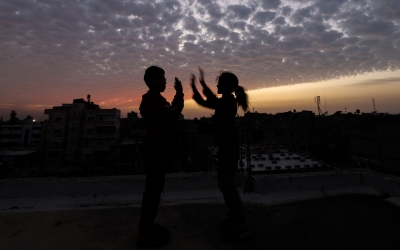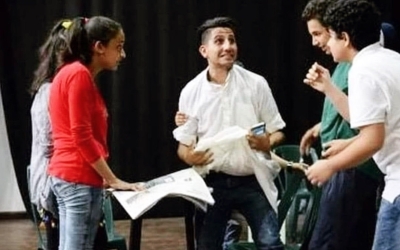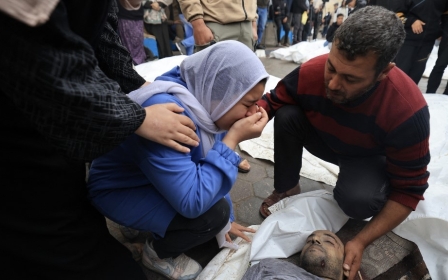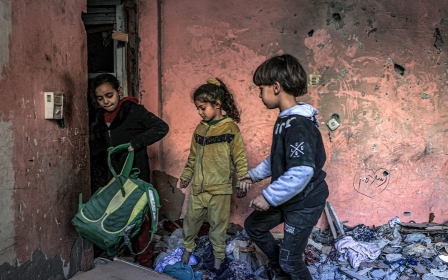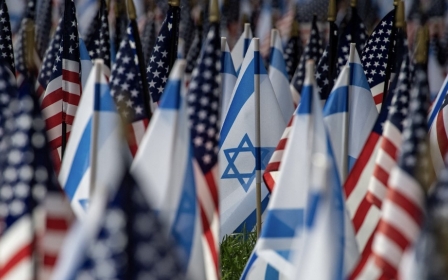War on Gaza: Israeli bombs hit north, south and central Gaza during brutal 24 hours
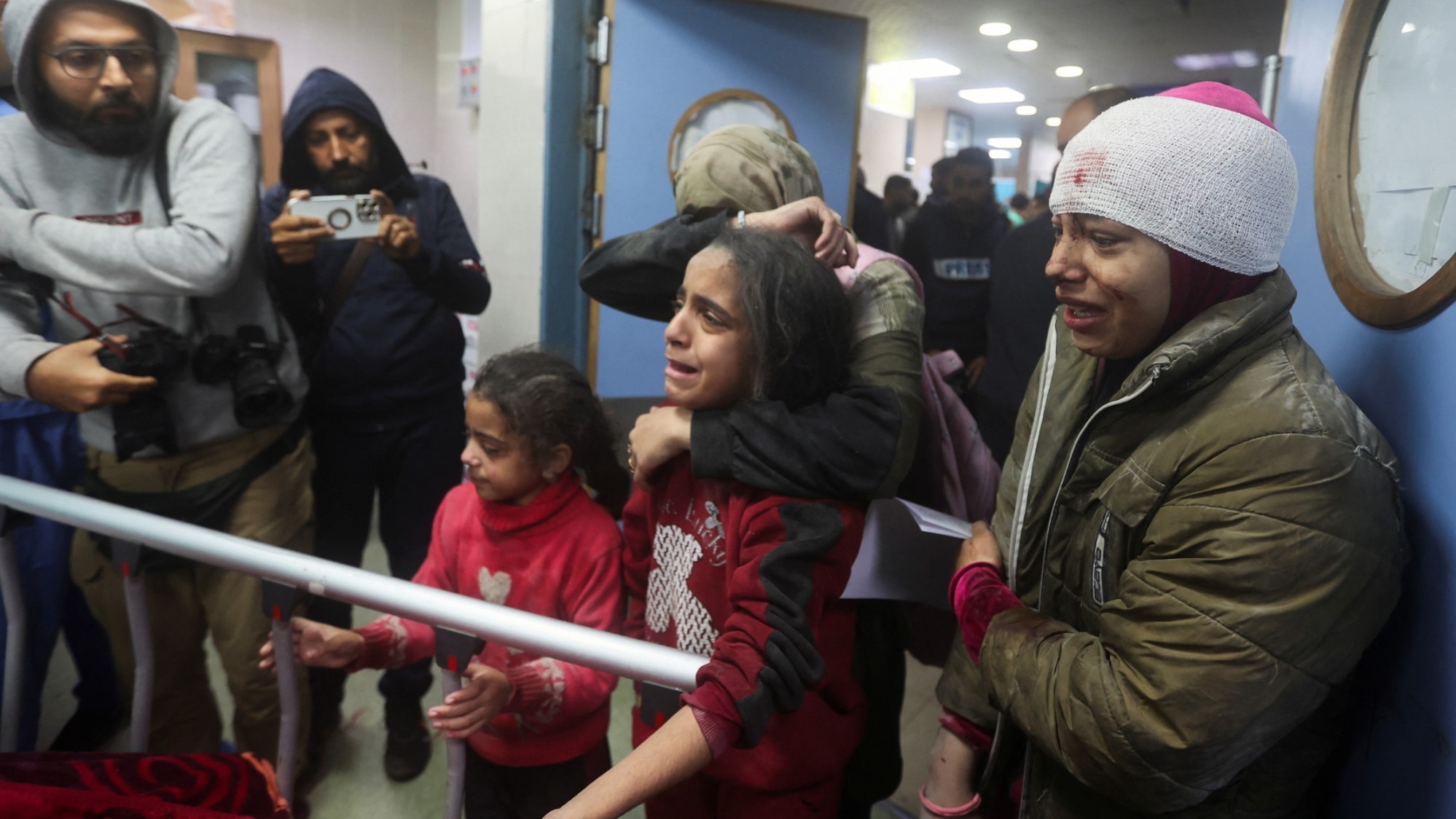
At least 210 Palestinians were killed and many more have been wounded over the past 24 hours, as Israeli forces rained down air strikes across the Gaza Strip on Thursday.
Israeli bombardment struck homes in Beit Lahia in the north, in al-Maghazi refugee camp in central areas, and in Khan Younis in the south, the Palestinian health ministry said. Several children were among those killed.
In Beit Lahia, two journalists were killed after an Israeli air strike hit their home.
Ahmad Khair al-Din and Mohammed Khair al-Din became the 104th and 105th reporters to be killed by Israel in Gaza since 7 October.
Renewed Israeli attacks on al-Amal hospital in Khan Younis killed at least 10 people, wounding 21 others, according to the Palestinian Red Crescent Society (PRCS).
"The PRCS expresses its deep concern for the safety of its staff working in the hospital and the headquarters of the society, especially since the latest targeting; today is the fifth targeting of the hospital and its surroundings in less than a week," PRCS said in a statement published on X.
"The occupation's intensification in targeting the vicinity of al-Amal Hospital during the past few days may be considered a prelude to targeting it directly."
Follow Middle East Eye's live coverage of the Israel-Palestine war
Amir, 28, who has been displaced to Rafah in southern Gaza, told Middle East Eye that food and clean water had become extremely scarce.
"My family and I have been forced to leave our home three times," he said. "I am certain that there is no area that is safe or suitable for human life in the entire Gaza Strip."
"I never imagined for a moment that I would be unable to secure a loaf of bread or that I would be standing in endless queues to access drinking water!"
Israeli forces renewed attacks on al-Maghazi camp in central Gaza, home to over 30,000 refugees officially registered by the United Nations.
It came as the Israeli army admitted on Thursday that it killed dozens of Palestinians in an air strike on the camp on Christmas Eve.
An army spokesperson told Kan news that the military regretted that the attack, which killed 70 people, had harmed people adjacent to the intended target.
"A preliminary investigation revealed that during the attack, additional buildings were damaged adjacent to the targets that were [meant to be] attacked," the spokesperson told Kan.
"[This] apparently resulted in harm to those not involved... The IDF regrets the harm to those not involved."
Israel has previously bombed the camp, but the attack on Sunday was described as one of the "deadliest" since the start of the conflict.
Fathiya, a mother of six daughters and two sons, spoke to Middle East Eye from the al-Maghazi camp, where she was forcibly displaced after her home came under attack.
"Amidst the alarming sounds of bombings, the constant fear of imminent danger, the scarcity of food, and the absence of safe drinking water, my children and I are also grappling with extreme cold," she said.
At least 21,320 people have now been killed by Israel in the Gaza Strip since the war began, the Palestinian health ministry said on Thursday. Another 55,603 people have been wounded, it added.
Israeli settlers attack Armenian quarter in Jerusalem
Outside of Gaza, Israeli settlers used the cover of the ongoing war on Gaza to attempt to take over a large part of the Armenian Quarter in occupied East Jerusalem.
The Armenian Patriarchate of Jerusalem has issued an emergency communique warning that a "massive and coordinated physical attack was launched on bishops, priests, deacons, seminarians, and other Armenian community members in Jerusalem," by Israeli settlers.
"Over 30 armed provocateurs in ski-masks with lethal and less-than-lethal weaponry including powerful nerve-agents that have incapacitated dozens of our clergy broke into the grounds of the Cow's Garden and began their vicious assault," said the statement.
Also in Jerusalem, thousands of Israelis marched towards the parliament building to demand the government reach a deal to return captives from Gaza.
In Nazareth, a group of Palestinian citizens of Israel organised a small protest calling for an end to the war. The demonstration comes amid Israeli police bans and crackdowns on anti-war protests.
In the occupied West Bank, at least 18 Palestinians were shot and wounded by Israeli fire overnight, the PRCS said.
Israeli forces launched raids in several cities at the same time, including Ramallah, Nablus, Jenin, Jericho, and Qalqiliya. One Palestinian was killed in Ramallah.
A United Nations report issued Thursday said the human rights situation in the occupied West Bank was rapidly deteriorating and urged Israel to "end unlawful killings" against the Palestinian population.
"The use of military tactics and weapons in law enforcement contexts, the use of unnecessary or disproportionate force, and the enforcement of broad, arbitrary and discriminatory movement restrictions that affect Palestinians are extremely troubling," UN rights chief Volker Turk said in a statement.
Middle East Eye propose une couverture et une analyse indépendantes et incomparables du Moyen-Orient, de l’Afrique du Nord et d’autres régions du monde. Pour en savoir plus sur la reprise de ce contenu et les frais qui s’appliquent, veuillez remplir ce formulaire [en anglais]. Pour en savoir plus sur MEE, cliquez ici [en anglais].


